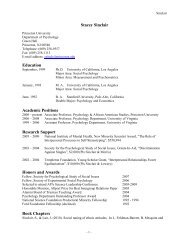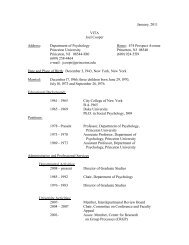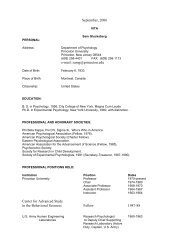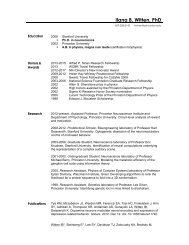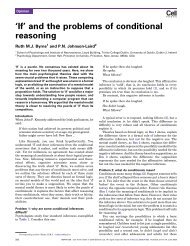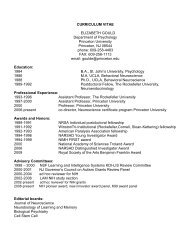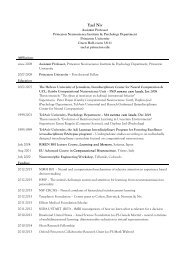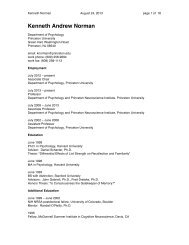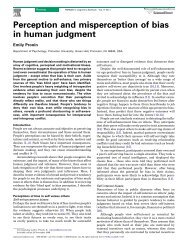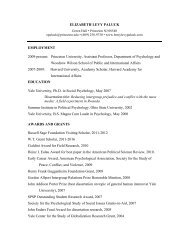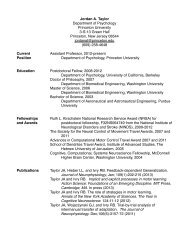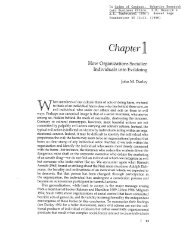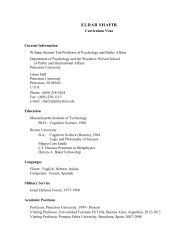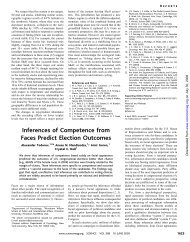ALEXANDER TODOROV Princeton University Department of ...
ALEXANDER TODOROV Princeton University Department of ...
ALEXANDER TODOROV Princeton University Department of ...
Create successful ePaper yourself
Turn your PDF publications into a flip-book with our unique Google optimized e-Paper software.
CV – Alexander Todorov 6<br />
Todorov, A., Pakrashi, M., & Oosterh<strong>of</strong>, N. N. (2009). Evaluating faces on trustworthiness <br />
after minimal time exposure. Social Cognition, 27, 813‐833. <br />
<br />
⎯ 2008 ⎯ <br />
<br />
Oosterh<strong>of</strong>, N. N., & Todorov, A. (2008). The functional basis <strong>of</strong> face evaluation. Proceedings <br />
<strong>of</strong> the National Academy <strong>of</strong> Sciences <strong>of</strong> the USA, 105, 11087‐11092. <br />
<br />
Spezio, M., Rangel, A., Alvarez, M., O’Doherty, J., Mattes, K., Todorov, A., Kim, H., & Adolphs, <br />
R. (2008). A neural basis for the effect <strong>of</strong> candidate appearance on election <br />
outcomes. Social, Cognitive, & Affective Neuroscience, 3, 344‐352. <br />
<br />
Todorov, A. (2008). Evaluating faces on trustworthiness: An extension <strong>of</strong> systems for <br />
recognition <strong>of</strong> emotions signaling approach/ avoidance behaviors. In A. Kingstone & <br />
M. Miller (Eds.), The Year in Cognitive Neuroscience 2008, Annals <strong>of</strong> the New York <br />
Academy <strong>of</strong> Sciences, 1124, 208‐224. <br />
<br />
Todorov, A., Baron, S., & Oosterh<strong>of</strong>, N. N. (2008). Evaluating face trustworthiness: A model <br />
based approach. Social, Cognitive, & Affective Neuroscience, 3, 119‐127. <br />
<br />
Todorov, A., & Duchaine, B. (2008). Reading trustworthiness in faces without recognizing <br />
faces. Cognitive Neuropsychology, 25, 395‐410. <br />
<br />
Todorov, A., & Engell, A. (2008). The role <strong>of</strong> the amygdala in implicit evaluation <strong>of</strong> <br />
emotionally neutral faces. Social, Cognitive, & Affective Neuroscience, 3, 303‐312. <br />
<br />
Todorov, A., & Olson, I. (2008). Robust learning <strong>of</strong> affective trait associations with faces <br />
when the hippocampus is damaged, but not when the amygdala and temporal pole <br />
are damaged. Social, Cognitive, & Affective Neuroscience, 3, 195‐203. <br />
<br />
Todorov, A., Said, C. P., Engell, A. D., & Oosterh<strong>of</strong>, N. N. (2008). Understanding evaluation <strong>of</strong> <br />
faces on social dimensions. Trends in Cognitive Sciences, 12, 455‐460. <br />
<br />
⎯ 2007 ⎯ <br />
<br />
Ballew, C. C., & Todorov, A. (2007). Predicting political elections from rapid and <br />
unreflective face judgments. Proceedings <strong>of</strong> the National Academy <strong>of</strong> Sciences <strong>of</strong> the <br />
USA, 104, 17948‐17953. <br />
<br />
Engell, A. D., Haxby, J. V., & Todorov, A. (2007). Implicit trustworthiness decisions: <br />
Automatic coding <strong>of</strong> face properties in human amygdala. Journal <strong>of</strong> Cognitive <br />
Neuroscience, 19, 1508‐1519. <br />
<br />
Hall, C. C., Ariss, L., & Todorov, A. (2007). The illusion <strong>of</strong> knowledge: When more <br />
information reduces accuracy and increases confidence. Organizational Behavior <br />
and Human Decision Processes, 103, 277‐290. <br />
<br />
Todorov, A., Gobbini, M. I., Evans, K. K, & Haxby, J. V. (2007). Spontaneous retrieval <strong>of</strong> <br />
affective person knowledge in face perception. Neuropsychologia, 45, 163‐173. <br />
<br />
Todorov, A., Goren, A., & Trope, Y. (2007). Probability as a psychological distance: Construal <br />
and preferences. Journal <strong>of</strong> Experimental Social Psychology, 43, 473‐482.



